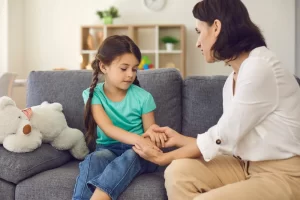Social Anxiety in Kids and Teens or Just Shy?

 You’ve probably noticed how hesitant your child is to make friends or talk to other kids in class. Maybe they dread conversations with adults and avoid eye contact at all costs. Is your child being shy or is something else going on?
You’ve probably noticed how hesitant your child is to make friends or talk to other kids in class. Maybe they dread conversations with adults and avoid eye contact at all costs. Is your child being shy or is something else going on?
As a parent, it can be hard to know whether your child has social anxiety or is simply shy and reserved. Both can be challenging in terms of how your child interacts with their world.
But for a child with social anxiety, life can feel completely overwhelming especially when they don’t know what’s wrong or how to cope.
What is Social Anxiety in Kids and Teens?
Social anxiety is a disorder that involves an intense fear or phobia of social and performance situations. It is often rooted in fear of judgement.
Since social anxiety is rooted in fear of people’s opinion of them, it’s common for kids and teens to work hard at hiding their symptoms. They definitely don’t want to bring more attention (and potential criticism) on themselves.
It’s possible that your child may be experiencing social anxiety if you notice:
- Your child avoiding social settings
- Having difficulty meeting other children
- Clinging to familiar people
- Intense dread of going to school or clubs
- Angry outbursts surrounding events or certain situations
Distinguishing Between Social Anxiety and Shyness in Kids and Teens
The confusion between social anxiety and shyness is common, but the difference is rooted in the why behind their actions.
Shyness in itself is not a problem. Many shy children have satisfying, long-term friendships with others and live happy and fulfilled lives. Shyness is an issue only when it prevents your child from engaging in enjoyable events such as parties, or from making lasting friendships. If that’s the case, it may be time to seek help.
It’s normal for kids to be nervous about new experiences, especially when these situations or events are social. A piano recital, football tryouts, or giving a speech at school can all lead to feeling stressed and nervous. Many kids who are shy however, do not have negative feelings and can warm up to people and situations eventually. Your child may not like being the center of attention, but they can get through it. Social situations do not cause them distress.
Kids experiencing social anxiety, however, usually try to avoid social settings altogether. Fear of what other kids will think of them is greater than their desire or need to be involved. Even if they love playing a sport at home, they may not think it’s worth it to play on a team and risk any judgement.
Signs of Social Anxiety to Watch for in Kids and Teens
Social anxiety can be caused by all kinds of factors – genetic, environmental, societal, and brain/biological. Some parents blame themselves, but it’s usually a combination of things that cause the disorder. The most important thing you can do is support your child and help them move forward.
Let’s take a look at some of the more common symptoms:
Common symptoms of social anxiety in kids
- Fear of:
- reading aloud or answering questions in class

- talking to other kids
- being in front of the class
- speaking to adults
- musical or athletic performance activities
- ordering food in a restaurant
- attending birthday parties
- having friends visit
- reading aloud or answering questions in class
- Worry about being judged by others
- Refusal to participate in activities or school
- Physical symptoms like sweating, blushing, shaky voice, headaches, stomach aches, and nausea.
Keep in mind that other kids may experience their anxiety more beneath the surface, with panicked thoughts that they might not express.
Common symptoms of social anxiety in teens
Although most teenagers go through periods of normal anxiety related to changes during adolescence, those with social anxiety experience fear that is out of proportion to the situations they face.
Here are some common symptoms for teens:
- are quiet
- keep to themselves
- are hesitant
- become more withdrawn if encouraged to talk
- fear being embarrassed or humiliated
- are passive
- cross their arms
- are overly concerned about negative evaluation
- keep their head down
- display few facial expressions
- have nervous habits such as hair twirling or fidgeting
- potentially do poorly in school
- don’t raise their hand in class
- avoid classmates outside class
- fear performing in front of others/public speaking
- fear speaking up in class
- are uncomfortable in the spotlight
- sit alone in the library or cafeteria
- are afraid to ask the teacher for help
- are afraid to walk into class late
- may refuse to go to school or drop out
- are uncomfortable in group settings
- have few friends
- are afraid to start or participate in conversations
- avoid eye contact
- are afraid to ask others to get together
- speak softly or mumbles
- are afraid to call others
- appear to always be “on the fringes”
- reveal little about themselves when talking to others
14 Ways to Help Your Child with Social Anxiety
Helping a child with social anxiety requires patience, understanding, and support. Here are some strategies that may be helpful.
 Open communication
Open communication
Encourage your child to express their feelings and thoughts. Let them know that it’s okay to talk about their anxiety.
Validate their feelings
Acknowledge and validate your child’s feelings without judgment. Let them know that it’s normal to feel anxious sometimes.
Educate them about anxiety
Explain what anxiety is and how it can manifest. Help them understand that many people experience anxiety, and it doesn’t make them weak or different.
Share your own experiences
Empathize with your child about times you’ve felt anxious in social situations and how you’ve faced your fears. You might say, “I often get nervous when meeting new people too”. This will help them understand that it’s OK to talk about anxious feelings. They’ll also feel that you understand and support them.
Gradual exposure
Gradually expose your child to social situations that trigger their anxiety. Start with small, manageable steps, and gradually increase the difficulty as they become more comfortable.
Model social skills
Demonstrate positive social behaviors and interactions. Children often learn by observing, so modeling appropriate social skills can be very effective.
Encourage positive self-talk
Teach your child to replace negative thoughts with positive ones. Help them develop a more positive and realistic inner dialogue.
Build self-esteem
Praise your child for their efforts and accomplishments. Help them build self-confidence by focusing on their strengths and encouraging them to pursue activities they enjoy.
Role-playing
Prepare your child in advance for situations that make them feel worried or fearful. Roleplay the situation at home and practice things they can do to make it easier.
Engage in detective thinking
Encourage your child to do some “detective thinking”. For example, if they think that everyone will laugh at them if they answer a question in class, get them to ask questions like “What’s the evidence they’ll laugh?” or “How do I know?” “What if they don’t?”
Seek professional help
If your child’s social anxiety significantly interferes with their daily life, consider seeking the help of a mental health professional, such as a therapist or counselor, who specializes in working with children.
Encourage hobbies and interests
Support your child in finding and pursuing activities they enjoy. This can help them build a sense of identity and connect with others who share similar interests.
Create a safe space
Ensure your child feels safe at home. Knowing they have a supportive and understanding environment can alleviate some of the stress related to social anxiety.
Collaborate with school
Work with your child’s teachers to create a supportive environment at school. Teachers can be valuable allies in helping your child navigate social situations.
Remember that progress may be slow, and it’s essential to be patient and celebrate even small victories. Every child is unique, so tailor your approach to their individual needs and personality. If in doubt, seeking guidance from a mental health professional is always a good idea.
Begin Online Therapy for Kids and Teens with Social Anxiety in Illinois and now Florida.
 If your child or teen is struggling with anxiety, there is hope! Anxiety is highly treatable and online anxiety treatment at Briefly Counseling can help.
If your child or teen is struggling with anxiety, there is hope! Anxiety is highly treatable and online anxiety treatment at Briefly Counseling can help.
Using Solution-Focused Brief Therapy, I help kids and teens reduce their anxiety and build resilience so they can become a happier, more confident version of themselves.
And kids love being able to receive counseling from the comfort and privacy of their own home. Studies have consistently proven that online therapy delivers equal results to in-office counseling.
As an experienced and caring therapist, I love providing counseling for anxiety. To start your child’s counseling journey, call me at 224-236-2296 or email Helena@BrieflyCounseling.com to schedule a FREE 20-minute consultation.
Helena Madsen, MA, LCPC is the founder of Briefly Counseling. I specialize in providing online short-term anxiety treatment for kids and teens ages 7 – 18 as well as Christian counseling.
Whether you’re on the North Shore, in Naperville, Chicago, Champaign, Barrington, Libertyville, Glenview, or downstate Illinois, I can help.
And effective 2024, I am now licensed in Florida! For parents in Jacksonville, Pensacola, Destin, Crestview, Coral Gables, Weston, Parkland, Naples, Marco Island, and Pinecrest, I have immediate openings.
Schedule your appointment or consultation today. I look forward to working with your child to quickly and effectively help them in activating their strengths, resources, and resilience, in order to live with confidence and hope.

